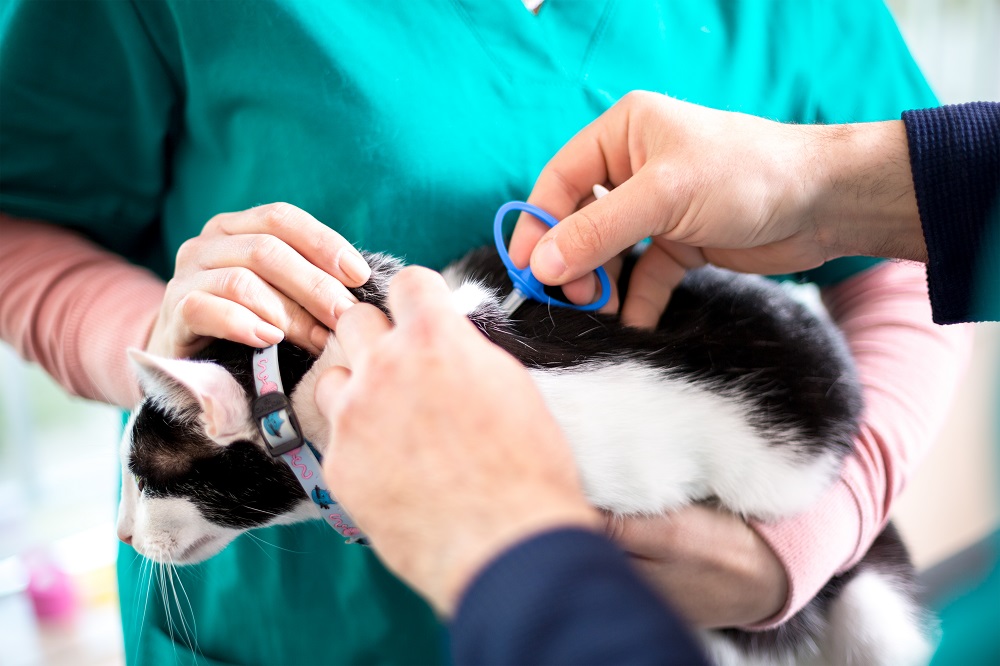RSPCA Cymru calls for compulsory microchipping of cats

RSPCA Cymru is calling on the Welsh Government to make the compulsory microchipping of cats a legal requirement.
New legislation from the UK Government means that cat owners in England have until 10 June 2024 to microchip their cats.
Owners found not to have microchipped their pets will have 21 days to get one implanted or may face a fine of up to £500.
While the Welsh Government’s Animal Welfare Plan promises to “consider extending compulsory microchipping to include kittens and cats”, there has not been any firm commitments or timelines published as yet.
The animal welfare charity’s calls follow the results of a survey conducted at the end of last month which showed that approximately two in three (65%) adults agreed with mandatory microchipping for cats in Wales¹.
It also found that 70% of those asked agreed that mandatory microchipping would improve cat welfare in Wales.
This rises to almost four in five among current cat owners (79%).
According to it’s latest figures, the RSPCA reports that 83% of cats brought into its animal centres across Wales and England last year were not microchipped.
Essential
Samantha Watson, scientific officer and cat welfare expert at the RSPCA said: “Microchipping is an absolutely essential component of being a responsible pet owner.
“Seven in ten adults in Wales agree that mandatory microchipping would improve cat welfare in Wales. This goes to show the public are heavily in favour of introducing microchipping laws, but it’s now down to the Welsh Government to take action.”
The RSPCA is encouraging all pet owners to microchip their pets, which is a quick and painless procedure and involves a tiny chip being inserted under the animal’s skin.
The microchip then gives the pet its own unique code.
Ms Watson added: “The microchip can be scanned and matched to the owner’s contact details which are kept on a database.
“We believe the optimum time to microchip a cat is when they are neutered as a kitten at around four-months-old and under anaesthetic.
“If an owner moves house or changes their telephone number they must also make sure that they tell the database they are registered with so that they have up-to-date contact details.
“If the information on that database is old and out-of-date then the chip is useless. Telling your vet does not automatically update the details on the database but this is something you can do yourself online.”
Support our Nation today
For the price of a cup of coffee a month you can help us create an independent, not-for-profit, national news service for the people of Wales, by the people of Wales.





I am sure that most of us who live in the country do not even understand the concept of ownership when it comes to cats.
They are feral creatures who live their lives in their own way.
Horendous creatures, who kill wildlife for fun & mess up peoples gardens!
Cats should be confined to their owners property!
At least they do not cause fatal injuries to humans like dogs do.
Cats are wonderful companions, and I’m sure most responsible owners would agree with the policy and already do this. But what about feral cats? Is this a first step to killing any un-chipped cats?
I hope so
Microchipping has been an option for animal owners since it was first introduced over 30 years ago. Presumably, until 2022, when microchipping of dogs became compulsory, and until now, as cat-owners come under the same State compulsion, owners were free to ensure the security of their property by means of the simple analogue device of a collar incorporating an address, if they were concerned about the possible disappearance of their animal. Of course, microchips might be thought to better discourage the theft of valuable pedigree animals, but it would obviously be an easy matter for any professional criminal to remove… Read more »
Cats don’t naturally belong in these islands. Keeping domestic cats promotes and even subsidises the killing of wild birds. That’s my quarrel with all cats and that’s why I responded to Nadine D above. Microchipping wouldn’t stop cats killing for fun but if the feral ones were culled the birds would have a better chance.
In New Zealand, the same logic applies to dear little Mrs Tiggywinkle – an introduced species rampaging through native populations of ground-nesting birds. And the cats there aren’t helping either.
Wait ’til you get lynx and wolves prowling the new Welsh forest where you used to ramble happily through the farmer’s crops or exercise your dogs by letting them annoy the dairy cows.
Please explain why? What if people cant afford it? £500 fine how was that figure arrived at?
RSPCA you would do better to spend your money on dealing with those people who have dogs at home all day while they are out of work.